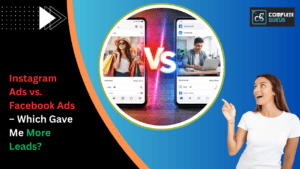In the ever-evolving world of digital marketing, two giants have consistently dominated the advertising landscape: Facebook and Google. As we step into 2024, businesses worldwide are eager to know which advertising platform will provide the best ROI (Return on Investment) and deliver the most significant impact on their marketing campaigns. In this comprehensive blog, we’ll take a deep dive into the advertising trends of 2024, analyzing Facebook Ads and Google Ads, to help you determine which platform is superior for your specific marketing objectives.
To learn more about Facebook and Google Ads, please click the link to our blog post, “Facebook Vs. Instagram Ads: Which Is The Ideal Choice For Your Business Growth?”
Understanding the Advertising Ecosystem
Before we delve into the comparison, it’s essential to understand the distinct ecosystems of Facebook Ads and Google Ads.
Facebook Ads: The Social Media Powerhouse
Facebook, with its expansive user base of over 2.8 billion monthly active users, is a social media behemoth. The platform allows advertisers to target specific demographics, interests, and behaviors, making it a potent tool for reaching highly segmented audiences. Facebook Ads include various ad formats, such as image ads, video ads, carousel ads, and more.
Google Ads: The Search Engine Titan
Google dominates the search engine market with an astonishing 92.47% global market share. Google Ads primarily revolve around search, display, and video advertising. Search ads appear when users search for specific keywords on Google, while display ads are shown on websites within Google’s Display Network. Video ads can be displayed on YouTube and across the web.
Key Advertising Trends in 2024
Before we determine which platform is superior, let’s explore the key advertising trends shaping 2024:
1. Privacy Concerns and Cookieless Tracking
Privacy concerns have led to significant changes in the advertising landscape. Both Facebook and Google have had to adapt to a cookieless tracking environment. Facebook has introduced its “Aggregated Event Measurement,” while Google is relying on Federated Learning of Cohorts (FLoC). Advertisers will need to master these new tracking methods to maintain ad effectiveness.
2. Video Content Dominance
Video content is king, and this trend continues to grow in 2024. While both Facebook and Google offer video advertising options, YouTube remains the undisputed champion in the video advertising arena. With more users turning to video content, advertisers must invest in compelling video ads to engage their audiences effectively.
3. Artificial Intelligence and Machine Learning
AI and machine learning have become integral to advertising success. Google’s Smart Bidding and Facebook’s automated ad campaigns leverage AI to optimize ad placements and budget allocation. Embracing AI-driven strategies will be crucial to staying competitive on both platforms.
4. Ephemeral Content and Stories Ads
The popularity of ephemeral content on platforms like Instagram and Snapchat has led to the rise of Stories ads. Both Facebook and Google offer options for running ads in Stories, providing advertisers with a dynamic way to connect with users. Creating engaging Stories content will be vital to success in 2024.
5. Sustainable and Ethical Advertising
Consumers are increasingly conscious of sustainability and ethical practices. Advertisers need to align their campaigns with these values to build trust and credibility. Both Facebook and Google have implemented ad policies that prioritize responsible advertising, including restrictions on political content and misinformation.
Facebook Ads vs. Google Ads: The Showdown
Now that we’ve explored the advertising landscape in 2023, let’s compare Facebook Ads and Google Ads based on critical factors that influence advertisers’ decisions.
1. Audience Targeting
Facebook Ads: Facebook excels in audience targeting, allowing advertisers to create highly granular audience segments based on demographics, interests, and behaviors. The platform’s Custom Audiences and Lookalike Audiences features are potent tools for reaching the right people.
Google Ads: Google offers audience targeting primarily through search intent and website behavior, making it effective for capturing users actively seeking information. Display ads also enable advertisers to target specific websites and demographics. However, it may not be as precise as Facebook for some niches.
Winner: Facebook Ads for precise demographic targeting; Google Ads for capturing search intent.
2. Ad Format Diversity
Facebook Ads: Facebook provides a wide range of ad formats, including image ads, video ads, carousel ads, and more. This diversity allows advertisers to experiment with various creative approaches.
Google Ads: Google offers search, display, and video ad formats. While these formats are effective, they are more standardized compared to Facebook’s extensive range.
Winner: Facebook Ads for creative diversity; Google Ads for standard, effective formats.
3. Search Intent vs. Discovery
Facebook Ads: Facebook is primarily a discovery platform. Users scroll through their feeds to discover content, making it ideal for brand awareness and engagement campaigns. However, it may not be as effective for capturing users actively searching for specific products or services.
Google Ads: Google is the go-to platform for capturing search intent. Users use Google to find answers and solutions, making it perfect for businesses looking to target users at the moment they express interest in a product or service.
Winner: It depends on your campaign goals. Facebook for discovery and brand awareness, Google for capturing search intent.
4. Cost and Competition
Facebook Ads: Facebook’s ad costs can vary significantly based on your target audience and competition. In some niches, it can be more cost-effective, while in others, it may be highly competitive and expensive.
Google Ads: Google’s ad costs are often influenced by keyword competitiveness. Popular keywords can be expensive, but the ROI from capturing high-intent search traffic can be substantial.
Winner: It depends on your budget and niche. Both platforms can be cost-effective if managed well.
5. Ad Placement
Facebook Ads: Ads on Facebook appear within the user’s feed or in the Stories section, providing a seamless experience. However, ad placement can sometimes disrupt the user experience if not well-targeted.
Google Ads: Google’s ad placements are more contextually relevant. Search ads appear when users actively seek information, and display ads can be tailored to specific websites or audiences.
Winner: Google Ads for contextually relevant ad placements.
6. Analytics and Tracking
Facebook Ads: Facebook provides detailed analytics through its Ads Manager, allowing advertisers to track ad performance and audience insights. The recent shift to Aggregated Event Measurement has impacted some tracking capabilities but still provides valuable data.
Google Ads: Google offers robust analytics through Google Analytics and Google Ads, allowing advertisers to track user behavior from click to conversion. The transition to FLoC may require adjustments in tracking strategies.
Winner: Google Ads for comprehensive tracking capabilities.
7. Ad Policy and Compliance
Facebook Ads: Facebook has strict ad policies to maintain a safe and respectful environment for users. Advertisers must adhere to these policies, which include restrictions on sensitive content and political advertising.
Google Ads: Google also enforces strict ad policies, particularly in areas such as healthcare and political advertising. Compliance with these policies is essential to avoid ad disapproval.
Winner: It’s a tie. Both platforms prioritize responsible advertising.
The Verdict: Facebook Ads vs. Google Ads
Determining whether Facebook Ads or Google Ads is superior depends on your specific marketing goals and target audience. Here are some scenarios where one might outshine the other:
Choose Facebook Ads If:
- You Want to Build Brand Awareness: Facebook’s extensive user base and advanced targeting options make it an ideal platform for brand awareness campaigns. You can reach users who may not be actively searching for your products or services.
- Your Audience Is on Mobile: If your target audience primarily uses mobile devices, Facebook’s mobile-friendly ad formats and app integrations can be highly effective.
- You Want to Leverage Social Commerce: If you’re in the e-commerce space, Facebook’s integration with shopping features can help you drive sales directly within the platform.
- You’re Focusing on Visual Content: Facebook’s emphasis on visual content, especially video, makes it a great choice if your marketing strategy relies heavily on multimedia.
- You Aim to Engage with Customers Through Messaging: If personalized messaging and chatbots align with your customer engagement strategy, Facebook’s Messenger and WhatsApp ad options are valuable.
Choose Google Ads If:
- You Want to Capture High-Intent Users: Google Ads is unparalleled when it comes to capturing users with immediate purchase intent. If your goal is to target users actively searching for your products or services, this is the platform for you.
- You’re Running a Local Business: For local businesses, Google Ads’ geotargeting and local extensions can drive foot traffic and online conversions effectively.
- You Need Flexible Budget Management: Google Ads offers more flexibility in budget management, allowing you to set daily or campaign-specific budgets, which can be beneficial for businesses with varying ad spend.
- You Want to Utilize Responsive Search Ads: If you want to optimize your ad copy dynamically to match user queries, Google’s Responsive Search Ads are a powerful tool.
- You’re Focused on B2B Marketing: If your target audience consists of businesses or professionals, Google Ads’ business-oriented features, like Google Ads for B2B and industry-specific targeting, can be advantageous.
Suggested reading: How Much Will It Cost To Hire Someone To Post On Instagram In 2023?
Conclusion
In the dynamic world of digital advertising in 2024, both Facebook Ads and Google Ads offer unique strengths and capabilities. The choice between the two ultimately depends on your marketing objectives, target audience, and industry.
For brand-building, reaching a diverse audience, and leveraging visual content, Facebook Ads excel. On the other hand, if your goal is to capture high-intent users, promote local business, or benefit from Google’s powerful search capabilities, Google Ads may be the superior choice.
To make an informed decision, consider conducting A/B tests, analyzing your audience’s behavior, and aligning your advertising strategy with the broader trends shaping the advertising landscape in 2024. Remember that the most effective advertising campaigns often incorporate a mix of both Facebook Ads and Google Ads to maximize reach and impact in a competitive digital environment.
If you are a small business owner looking to grow your business in 2024, investing in Facebook & Instagram Ads with the help of an expert like Complete Gurus can be the best decision you make. With their expertise and experience, they can help you maximize your reach and achieve your business goals using facebook Ads.

I am Ashutosh – a seasoned digital marketer, bringing digital transformation to businesses, complementing businesses’ growth via generating qualified leads, drive site inbound traffic via organic and inorganic approach, & build their brands through useful, well-designed marketing strategies and Marketing Automation implementation via Chat GPT, HubSpot & Zoho.







